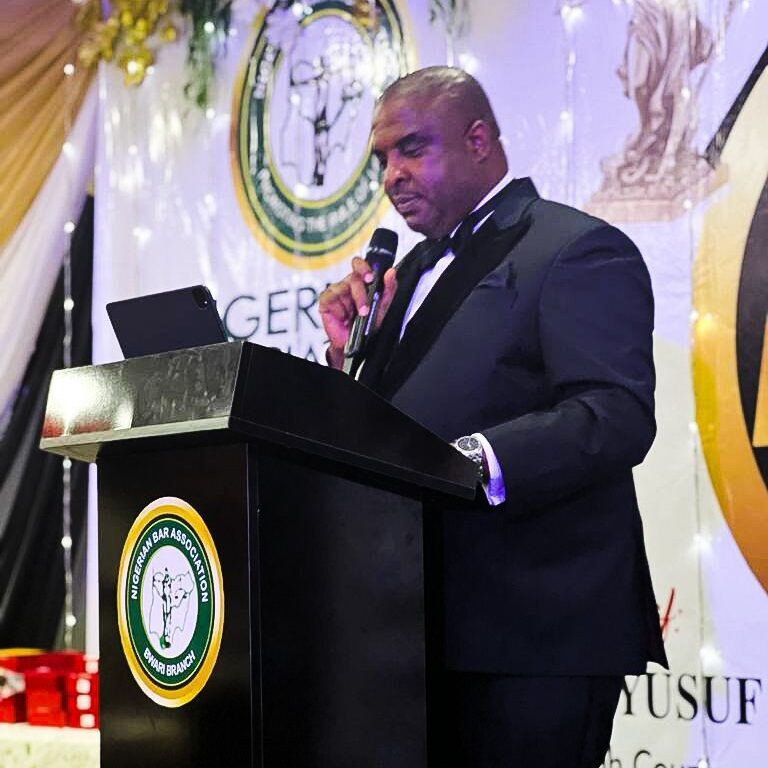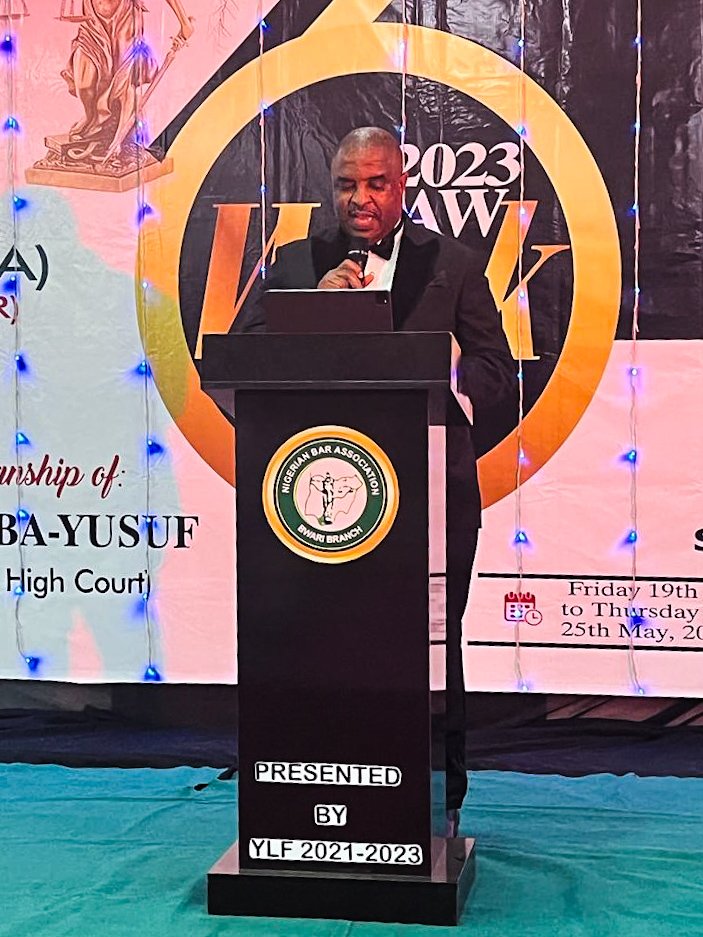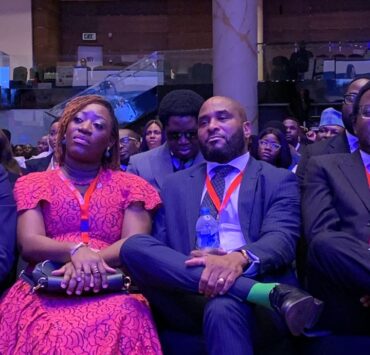Artificial Intelligence and the Future of Legal Practice in Nigeria by Tobenna Erojikwe

Lawyard is a legal media and services platform that provides…
Partner at TheLawCrest LLP and Chairman of the Nigerian Bar Association Institute of Continuing Legal Education (NBA-ICLE), Tobenna Erojikwe has emphasised the need for the Nigerian Bar Association (NBA) to prioritise the empowerment of lawyers to enable them maximise the opportunities that come with the advent of artificial intelligence (AI).
Speaking at the annual bar dinner of the NBA Bwari Branch on Thursday, 25 May, Erojikwe noted that AI was certain to “radically disrupt the way that law is practiced in Nigeria”. The NBA-ICLE chairman however added that, beyond AI, there were other challenges confronting legal practice in Nigeria, which similarly called for a strategic response from individual lawyers, law firms and the NBA.
“In order to face the challenges, we must have an awareness at the level of the Bar Association. Members must learn to think differently. A total mental reorientation will be required. An Association that solely focuses on welfare without investing in empowerment cannot face the challenges that AI and the other disruptors mentioned portend,” Erojikwe said.

The full text of the dinner speech is reproduced below:
Mr. Chairman of Bwari Branch of the Nigerian Bar Association, Monday Adjeh Esq, distinguished members of the EXCO of the Branch, the Chairman of the Planning Committee of the 2023 Law Week of the Bwari Branch, my friend and brother, Paul Daudu, My Lords, distinguished Senior Advocates of Nigeria, Seniors, Colleagues and Friends, it is a great honour and indeed a huge privilege to be asked to deliver today’s dinner speech.
First, I must commend the Bwari Branch for what has been a truly amazing Law Week. During the course of the week, you created a high voltage environment for rigorous intellectual engagement and assembled some of the best minds that our profession has to offer to interrogate very topical issues that challenge us as practitioners day to day. For that and of course, the excellent dinner that we all expect to be served, you deserve every commendation that you get.
I am extremely proud of my relationship with the Branch, not least because of the enthusiasm with which the Branch and indeed its members have supported the activities of the NBA Institute of Continuing Legal Education since I became Chairman of the Institute. I thank you for your suggestions and will not fail to mention my friend and NBA-ICLE Champion, Dr Mentor Oriere who does not fail to make suggestions whenever he feels that the need arises to do so.

Before moving to the substance of the business of the day, I must say that I find the theme of the Law Week to be of extreme interest considering where we are as a country, today. I know that those of you who listened to my friend, Chimamanda Adichie during the Annual General Conference last year would expect my speech perhaps to be as romantic as those love letters that she said that I wrote as a teenager but I must disappoint you because the theme of the week demands that we must approach the conversations that we have here with the utmost seriousness.
‘A vibrant bar: a panacea towards good governance and sustainable development.’ There are very deep phrases in the theme that, of necessity, must call us to reflect. ‘A vibrant bar’, ‘good governance’ and ‘sustainable development’. The theme suggests that the Bar, if vibrant, would act as a catalyst for the good governance and sustainable development that we would like to see in Nigeria. Now the maxim nemo dat quod non habet comes to mind – Raises the question of giving what we don’t have which then leads to a more important question of qui costodia, ipso costodiet? Can we be vibrant and a watchdog if we are not independent? Do we need a total reorientation? What I will say most emphatically is that it is in our enlightened self-interest to do everything to secure our independence and integrity. It is, as far as I am concerned, an existential issue that must be tackled today and not tomorrow.
Anyway, now to the topic of the day.
‘Artificial Intelligence: The Future of Legal Practice.’ I would ask your indulgence to add, in Nigeria.
So, we will approach this from three angles: where we are, where we ought to be and where we should be thinking of going.
I would ask you to please listen very attentively to the following commentary on the topic of the today.
Title: Artificial Intelligence: The Future of Legal Practice
Introduction
Artificial Intelligence (AI) has revolutionized various industries, and the legal profession is no exception. With its ability to analyze vast amounts of data, detect patterns, and make informed decisions, AI is reshaping the way legal practitioners work. In this article, we will explore the potential of AI in the legal field and discuss how it is transforming the future of legal practice.
Understanding Artificial Intelligence
Artificial Intelligence refers to the development of intelligent machines that can perform tasks that typically require human intelligence. AI systems use algorithms and machine learning to analyze data, recognize patterns, and make predictions or decisions. In the legal field, AI technologies are being applied in various areas, such as legal research, contract analysis, document review, and legal decision-making.
Enhancing Legal Research
Traditionally, legal research involved hours of sifting through piles of documents and case law to find relevant information. However, AI-powered research tools have significantly improved the efficiency of this process. Natural Language Processing (NLP) algorithms enable AI systems to understand and interpret legal texts, making it easier to extract relevant information and identify relevant case precedents. By automating legal research, AI helps lawyers save time, streamline their work, and deliver more accurate results.
Streamlining Contract Analysis
Contracts are an essential aspect of legal practice, but reviewing and analyzing them can be time-consuming and prone to human error. AI-based contract analysis tools can automatically review contracts, identify key provisions, and extract important information. Machine learning algorithms can even be trained to spot potential risks and suggest revisions. This not only speeds up the contract review process but also minimizes the chances of oversight or mistakes.
Automating Document Review
The review of legal documents, such as discovery materials, can be tedious and overwhelming. AI-powered document review platforms leverage technologies like machine learning and natural language processing to automate the document review process. These systems can quickly analyze and categorize large volumes of documents, identify relevant information, and flag potentially significant documents for further review by human lawyers. This combination of AI and human expertise ensures a more efficient and accurate document review process.
Predictive Analytics in Legal Decision-making
AI’s predictive analytics capabilities have the potential to transform legal decision-making. By analyzing historical case data and identifying patterns, AI algorithms can predict the outcomes of legal disputes with a reasonable level of accuracy. This can assist lawyers in assessing the strengths and weaknesses of their cases, enabling them to make informed decisions on litigation strategies, settlement negotiations, and risk assessments. While AI predictions are not infallible, they serve as valuable tools to augment human judgment.
Ethical Considerations and Challenges
The integration of AI in the legal profession also raises ethical considerations and challenges. The reliance on AI systems for legal tasks must be accompanied by safeguards to ensure data privacy, accuracy, and fairness. Transparency in algorithms and accountability for AI-generated decisions are critical to maintaining the integrity of the legal system. Additionally, there is a concern that AI may replace human lawyers, leading to job displacement. However, proponents argue that AI will augment human capabilities rather than replace them, allowing legal professionals to focus on higher-value tasks.
The Future of AI in Legal Practice
The future of legal practice will undoubtedly be shaped by AI technologies. As AI continues to evolve, we can expect more sophisticated tools that can perform increasingly complex legal tasks. The integration of AI will result in a more streamlined, efficient, and accessible legal system. Legal practitioners will have more time to focus on strategic thinking, client counseling, and negotiation, while routine tasks are automated. Additionally, AI can help bridge the gap in legal services, making legal assistance more affordable and accessible to underserved populations.
Conclusion
Artificial Intelligence is revolutionizing the legal profession, offering numerous benefits and transforming the way legal practitioners work. While there are ethical considerations and challenges to overcome, the future of AI in legal practice holds tremendous potential for increasing efficiency, accuracy, and accessibility. Embracing AI technologies will empower legal professionals to provide better legal services, enhance decision-making, and ultimately, promote justice in an ever-evolving legal landscape.
Now dealing with where we are, where we ought to be and where we should be going. I will consider these under a number of heads and will apply them to the individual, the Law Firm and the Bar Association.

It is extremely clear to me as it is that night will come and day will break that the advent of AI will radically disrupt the way that law is practiced in Nigeria. Much more important is the fact that there are many other existential issues that confront us which along with the advent of AI diminish our practice space. We have the more for less issues, the challenge by other professionals who encroach on our space as well as foreign law firms, globalisation and liberalisation. These issues are real and I dare say that the legal community in Nigeria is not equipped practically and mentally to face the challenges ahead.
In order to face the challenges, we must have an awareness at the level of the Bar Association. Members must learn to think differently. A total mental reorientation will be required. An Association that solely focuses on welfare without investing in empowerment cannot face the challenges that AI and the other disruptors mentioned portend. Members of the Bar need to make sure that their prospective leaders are properly interrogated and that those leaders know where the profession should be. In determining leadership, key questions must be asked of aspiring leaders, beyond ‘he is friendly, he told me first or he paid for me to share accommodation with other lawyers at an event’. At the law firm level, we must have a leadership and organisational structure that is aware, has a clear vision and clear direction of travel. Law firms must think beyond individual ownership and look at efficient ways of running sustainable practices.
We must adopt progressive strategic planning and business development ideas, invest in training and professional development, engage with technology and innovation, adopt an effective and well-structured client-centric approach, be prudent about finances and put in place sustainable financial policies, pay attention to growth and the welfare of employees.
At the NBA-ICLE, we are doing all that we can to ensure that we expose our members to emerging areas of practice from Fintech to technology & Innovation, entertainment law, Energy transition, Digital Transitions and others. The lawyer that would survive the advent of AI is one that has such knowledge that the value that he or she will bring will be far greater than anything any AI will do. From the things that we have and are doing, real opportunities have been created and are being created at no cost to the recipients. I would encourage you to visit NBA ICLE YouTube Channel for free trainings by local and international experts. It is critical that we are in tune, efficient, effective and competitive.
I grew up in the University campus in Nsukka and throughout my time there, I was taught that the only thing that man has not created is what man has not imagined. In my days practicing in England, I saw systems that I thought was very efficient discarded, I saw large physical libraries totally shut down and transitioned into e-libraries, I saw efficient filing and storage systems discarded for e-filing and paperless systems. I was fascinated at some point by the fact that I could sit on my desk and access materials from the best journal publications and libraries in the world but now, even most of that can be done by Chat GPT or Timi.
I will close by leaving you with one of my favourite quotes. A quote by Justice Chukwudifo Oputa of blessed memory:
“THE SUPREME COURT SHOULD ALWAYS BE ALIVE TO THE IDEA THAT AS A SOCIETY IS ORGANIC EVEN SO SHOULD LAW BE. ANYTHING ORGANIC IS SUBJECT TO THE LAW OF LIFE WHICH IS EITHER GROW OR DIE. WE ARE EITHER ASCENDING THE STEPS OF LIFE OR ALSO DESCENDING INTO THE PRECIPICE OF DEATH”
Lawyard is a legal media and services platform that provides enlightenment and access to legal services to members of the public (individuals and businesses) while also availing lawyers of needed information on new trends and resources in various areas of practice.















